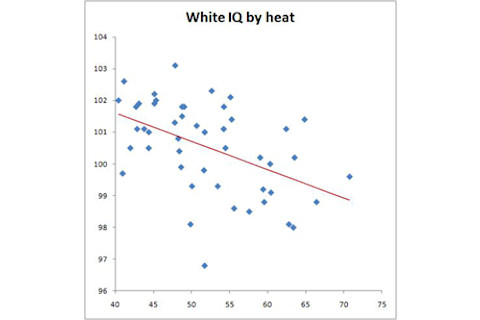
There's a fair amount of evidence for greater social pathology among whites of Southern origin. One of the major issues that Blue State liberals like to point out that is that on metrics of moral turpitude Southern whites stand out; those who promote a narrow and strident conception of ethical behavior are the most likely to transgress those very norms. Logically one might contend that in a society where there is no murder there need be no laws against it. Similarly, in our society we don't have specific laws against consumption of one's own children for food because it is such a rare occurrence, in contrast to sexual abuse and what not. So the Southern promotion of an ethic of sobriety might very well be due to the fact that social disorder is generally far closer to the surface. But in any case, we might need to go beyond the proximate scale to understand these patterns.
In Albion's Seed the historian David Hackett Fischer argues that there are "Four Folkways" which established themselves on these shores before American Independence.
They are the Puritans of the New England, who are directly descended from Middle Class immigrants disproportionately from East Anglia who wished to practice a Calvinist form of English Protestantism (nobility and the poor were actually rejected as potential migrants!). In the highlands of the interior, what became Appalachia, settled the Scots-Irish, who hailed generally from the borders between England and Scotland and the Protestant colony in Ulster. In the lowlands of the South, starting in Virginia and on down toward Georgia you found settlements focused on aristocrats, often younger sons without title. Their estates were also characterized by a large underclass of poor. A symbiotic (exploitative) class relationship developed between this American gentry and their wards which recapitulated many of the cultural structures evident in southwest England, the stronghold of the Cavaliers. Finally, in the Mid-Atlantic between Maryland the Hudson river valley there was a melange of settlements of disparate origin. Fisher claims that the central organizing identity in this area was that of the religious non-conformists from the Midlands of England, such as Quakers, but he admits that the diversity of this region makes it harder to generalize, from the Dutch Patroons of New York to the Swedish settlement in Delaware. Ultimately the Mid-Atlantic Folkway is perhaps one defined by its pluralism and capitalist pragmatism, a lack of a coherent principled Folkway in some sense. Fisher's claim is made that these Folkways serve as important explanatory paradigms across both time and space. That is, they're not simply features of the pre-1776, but they can allow us to gain insight into what makes Minnesota different from Texas. I use these two states as examples because both were settled after the period of the crystallization of the Four Folkways during the colonial period, and they are also to a large extent defined by non-British immigrants who arrived in the 19th century, Germans in central Texas and Scandinavians in Minnesota. Nevertheless, Fisher would assert that Texas is a compound of the Scots-Irish and Lowland South Folkway (contingent upon climate and economic orientation; e.g., moist southeast Texas vs. dry northwest Texas). Minnesota is part of what is termed "Greater New England." In fact, several New England states had colonies further to the West which have left their cultural stamp, such as Conneticut's Western Reserve in northern Ohio. The city of Portland, Oregon, could have been Boston, Oregon, because the two men who were arguing over its name hailed from Maine and Massachusetts. The power of these identities over the long term in particular regions across ethnic groups is highlighted by the Boston Irish. Arriving in the 19th century the Irish were opposed by the Puritan descended Brahmins of Boston. John F. Kennedy rise was the final rebuke to the ascendancy of lineages such as Henry Cabot Lodge's. That being said, many would assert that Kennedy was simply a Brahmin himself by culture, and the famed Boston accent which he sported is a direct descendant of the dialect of East Anglia! Similarly, Germans and Scandinavians in the Upper Midwest and the Pacific Northwest also are descended culturally from the early Puritans despite their non-British ancestry, and quite often their non-British religion (Lutheran or Catholic). In fact, though I was born in an Asian country I was raised in in Greater New England, and I have to admit that I tend to carry within me cultural biases which I suspect were inculcated by a Puritan-descended outlook. To a great extent David Hacket Fisher is claiming massive Founder Effect. This is most evident in language; western New England had a major effect on the accents of the interior regions across the North. On the other hand, the rhythm of the Minnesota accent many also derive in part from the nature of Scandinavian languages, so some synthesis also went on. But Fisher would argue that language is simply one among many cultural characteristics which persist across time and exhibit spatial variation. For example, it is arguable that Puritan New England was the first society to attain universal literacy. Today, Boston is the Athens of America and New England has a disproportionate number of America's elite universities (Four Ivy League schools as well as the top technical university, along with a host of other exception institutions such as Tufts and Boston University). The tendency toward interpersonal violence and conflict was already notable in the South, both the Uplands and Lowlands, at an early period. During the 19th century one of the major reasons that John Brown and his families were heroes in Kansas is that they were among the few Northerners who seemed capable and willing to match the Southern immigrants in violence and aggression. To this day the "Jacksonian" South maintains the greatest esteem for the martial professions and contributes a disproportionate number of soldiers to the American armed forces. There are a few issues with Fisher's thesis though. Let's take the major facts correlated across time and space as givens, that New England characteristics noted during the 17th century can be observed today in the 21st. What else could explain the patterns? Perhaps immigrant streams were biased toward regions which were more congenial to their own orientation? East Anglia has long had relations with other North Sea nations such as The Netherlands and Norway, so the cultural Zeitgeist of the Upper Midwest might have been more congenial to Scandinavian migrants than the South. But it seems that this doesn't work so well for explaining the Boston Irish and European migrants who arrived in northern cities during the phase of industrialization; this wasn't selection for cultural congeniality but economic opportunity. The major region of the South which received large numbers of 19th century immigrants would be Texas, which though diverse and peculiar, is still recognizably Southern. Are its German immigrants similar to the Germans of Illinois, Wisconsin and Missouri? In actuality things are probably not as stark in terms of replacing ancestral culture as one might assume from accent; Peter Richerson and Robert Boyd have reported work that suggests that German descended farmers in Illinois tend to exhibit different patterns of economic optimization than Anglo-Saxon descended farmers. The culture of the latter did not wholly replace the ancestral one of the former, though I think that one might assert that German & Anglo-Saxon farmers in Illinois have more in common with each other than with their co-ethnics in Texas. But at this point I want to move to something else. A post, Colder climates favor civilization even among Whites alone, claims that there are environmental factors which are perpetuating the differences among the Four Folkways:
As you can see, hotter average temperature is associated with lower White IQs, fewer degrees being awarded to Whites per capita, and a higher percentage of the White population being imprisoned. The relationship looks pretty linear in each case, and the data are on an interval scale, so we check the Pearson correlation coefficient: between White IQ and temperature, it is -0.48 (p = 0.0005, two-tailed); between degrees to Whites and temperature, it is -0.57 (p = 0.00002, two-tailed); and between percent of Whites in jail and temperature, it is +.40 (p = 0.005, two-tailed). Even conservatively correcting for three independent hypotheses still leaves all results significant (and IQ and getting a college degree are not even independent). At any rate, average temperature accounts for 23%, 32%, and 16% of the variance in White IQ, degrees to Whites, and percent of Whites in jail, respectively....
Here's the possible causation:
If it is causation, as seems likely, the mechanism could be anything. Pathogen load is surely part of it, hence the fields of study called "tropical disease" and "tropical medicine." Also, you might sweat too much in hotter environments, bringing you closer to dehydration. As mild as these effects may seem, when accumulated over the course of development, they could result in your body spending more resources on bodily maintenance than on luxury items like IQ and toil. Heat could also just make you more fatigued -- that wouldn't affect IQ, but it would affect your work ethic, making you less likely to complete college and more likely to pursue quick fixes like crime to get what you want.
The idea that climate and civilization are related are as old as the Greeks. It's a complicated topic, but the economic historian David Landes in Wealth and Poverty of Nations has made the case that hotter climates tend to be so enervating as to drain productivity. Primitive technologies can usually increase heat in colder climates, but before air conditioning keeping cool was a difficult proposition. Landes and others have argued that the economic boom of the American South is directly related to the spread of air conditioning, which removed a major environmental impediment toward optimal productivity. The ecological problems with the Lowland South are noted in Albion's Seed; whites in these regions were subject to far greater disease mortality, and their total fertility was far below that of New England. Even with air conditioning and modern technology I'm not sure that all the various factors of warmer climates have been removed from the equation. For a large organism such as ourselves it may be that optimal temperature and climate is importance on the margins when it comes to activities which might be applicable to a post-Industrial economy. But I also think that Fisher's Founder Effect thesis needs to be extended: the frugal New England cultural ethic which demanded a strong level of communal participation might not have succeeded well in the disease ridden South. Too many people might be ill, or, gatherings of humans could spread communicable diseases, and so forth. Over the generations the initial differences might also have compounded through cultural evolution. If the enervating climate of the American South produced a slightly duller populace then the cultural development might have reacted in a manner so as to generate a positive feedback loop perpetuating norms which lead to relative dullness in relation to their potentiality. The inverse situation might apply to New England. Additionally, we can't ignore the contingent factors. Civilization arose in moderate climates but seems to have moved north more easily than south. The shift north could be due to the fact that technologies to perpetuate warmth were easier to produce than those to generate cold.













